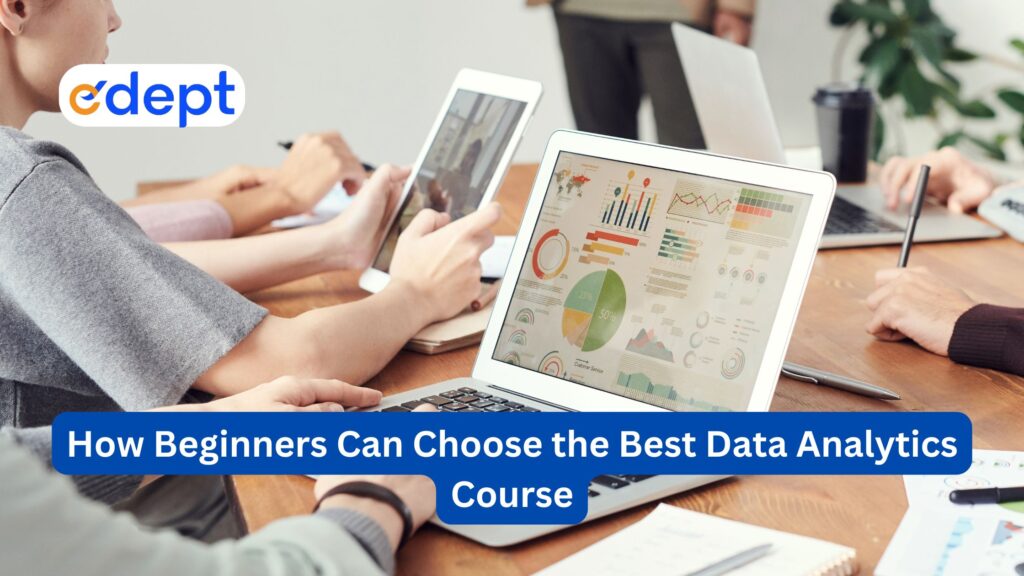
Starting a career in data analytics can be exciting. It’s a field that is growing fast and offers many job opportunities. But if you’re new to this area, one of the first questions you’ll ask is: “Which data analytics course should I take?”
With so many data analytics courses available online, it’s easy to feel confused. Some are free, some are paid, and all promise to teach you the skills you need. So how do you choose the one that’s best for you?
In this blog, we’ll break it down step by step so you can choose the right course—especially if you’re a beginner. We’ll also point out what makes a course truly helpful, and introduce one platform that’s getting a lot of positive attention: Edept.
1. Know Why You Want to Learn Data Analytics
Before you start looking at courses, ask yourself: Why do I want to learn data analytics?
-
Do you want to become a data analyst?
-
Do you want to make better business decisions using data?
-
Are you planning a career switch?
Knowing your goal helps you pick a course that fits your needs. If you’re starting fresh, look for data analytics courses for beginners that focus on basics first. Later, you can go for advanced programs.
2. Check What the Course Covers
A good data analytics course should teach you the key tools and topics used in real jobs. At a beginner level, the course should include:
-
Excel or Google Sheets for working with data
-
SQL to get data from databases
-
Data Visualization using tools like Power BI or Tableau
-
Basic Statistics to understand patterns in data
-
Projects to help you practice what you learn
The course should not jump into complex topics right away. It should start slow and help you build a strong foundation.
3. Pick the Right Learning Style
Different people learn in different ways. Think about what works best for you:
-
Self-paced courses: You watch videos and learn on your own. These are flexible and good if you have a busy schedule.
-
Live classes: You attend classes online at fixed times. These are helpful if you need guidance and motivation.
If you prefer more structure and want someone to guide you, live sessions are a great choice. Edept, for example, offers live online classes that are designed especially for beginners. You get to interact with teachers, ask questions, and learn step by step.
4. Look for Hands-On Projects
Reading and watching videos is not enough. To truly understand data analytics, you need to practice.
Good data analytics courses online include:
-
Small tasks to apply what you’ve learned
-
Full projects that use real data
-
Final assignments where you analyze data and present insights
This kind of practical work helps you build a portfolio, which is important when applying for jobs.
Courses like the one from Edept include hands-on projects that let you work on real business problems. You don’t just learn—you build experience.
5. Make Sure You Get a Certificate
A certificate proves that you’ve completed a course and learned useful skills. It can help you:
-
Get noticed by employers
-
Add value to your resume or LinkedIn profile
-
Show your progress if you’re switching careers
Choose a course that gives you a certificate that is recognized by companies. Platforms like Edept offer certifications that are respected in the industry and can boost your chances of getting hired.
6. Check for Support and Mentorship
As a beginner, you will have questions. You may get stuck while learning. That’s why support is important.
Look for courses that offer:
-
Mentor support
-
Live Q&A sessions
-
Career guidance
-
Peer learning groups
Having someone to guide you when you’re stuck can keep you moving forward. Some platforms even help you prepare for job interviews.
7. Compare Course Prices and What You Get
Some courses are very expensive, while others are affordable or even free. Price alone doesn’t tell you how good a course is.
Look at:
-
What topics are covered
-
Whether it includes real projects
-
If you get help from teachers or mentors
-
Whether you receive a certificate
It’s okay to invest in a paid course if it gives you all of the above. Edept, for instance, offers a balanced course that’s both affordable and packed with value for beginners.
8. Read Reviews and Learner Feedback
Before signing up, look at what other students are saying. Reviews can tell you:
-
If the content is beginner-friendly
-
How helpful the teachers are
-
Whether the course really helped learners get jobs
You can check reviews on course platforms, LinkedIn, or Google. This will give you confidence in your choice.
9. Think Long-Term: What Comes After the Course?
A good course doesn’t just teach you—it prepares you for what’s next. That could mean:
-
Helping you apply for internships or jobs
-
Giving you access to advanced courses
-
Offering updates on new topics and tools
Think about what kind of support you’ll get once the course ends. A strong course will help you keep learning and growing, even after your certificate is in hand.
Final Thoughts
If you’re new to data and want to start a career in analytics, picking the right course is your first important step. The best data analytics courses for beginners are the ones that:
-
Start with the basics
-
Include hands-on practice
-
Offer live support or mentorship
-
Provide a certificate
-
Help you get ready for real jobs
There are many platforms out there, but only a few truly focus on beginner success. If you’re looking for one that offers live classes, real-world projects, and expert guidance, Edept is a great place to start.
Your journey into data analytics starts with just one decision—choosing the right course. Take your time, explore your options, and pick the course that gives you the skills and support you need to succeed.



